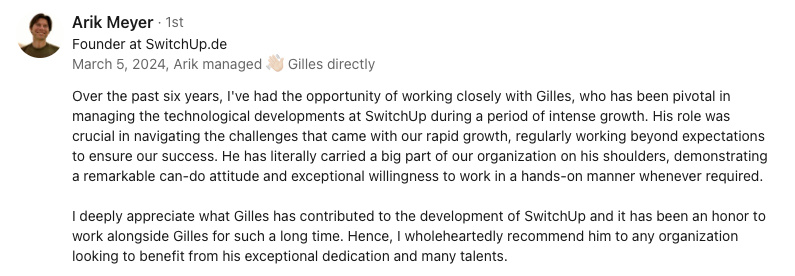Abstract:
The article emphasizes the importance of local ecosystems for social tech startups, highlighting how these environments offer more than just funding and infrastructure by providing strategic resources that facilitate growth from idea to execution. It details the components of a robust ecosystem, including universities that serve as talent and innovation hubs, government programs offering financial and regulatory support, and NGOs that enhance social impact through partnerships. Unique examples, such as the collaboration between a German startup and the Technical University of Munich, illustrate how academic partnerships can accelerate technological innovation. The article also underscores the benefits of engaging with local tech communities and strategic alliances, which provide mentorship, access to cutting-edge research, and enhanced credibility, making startups more attractive to investors. Additionally, it outlines strategies for building effective local partnerships and navigating the regulatory and funding landscapes in Europe, emphasizing the need for startups to understand and leverage these dynamics to overcome challenges like diverse regulatory environments and competition. Overall, the article encourages social tech entrepreneurs to integrate into local ecosystems to amplify their impact and drive meaningful societal change.
Navigating the world of social tech ventures is not just about having a great idea or securing initial funding. It's about understanding and integrating into a supportive local ecosystem. These ecosystems are not mere buzzwords; they are the environments where startups can genuinely grow and succeed.
For social tech entrepreneurs, the local ecosystem is brimming with opportunities. Universities offer cutting-edge research and a steady stream of new talent, while government programs provide financial support and beneficial regulations. But what makes a local ecosystem so crucial for social tech startups, and how can they leverage these resources for maximum impact? Let's explore how these ecosystems function and what startups can do to thrive and make real changes.
Whether it's collaborating with universities, utilizing government resources, or partnering with NGOs, understanding and engaging with the local ecosystem is key. These elements come together to create environments where social innovation can not only survive but truly shine.
Understanding Local Ecosystem Dynamics
Social tech ventures flourish when they are part of a supportive local ecosystem. These ecosystems are more than just funding and infrastructure; they encompass elements that aid startups from the idea stage to execution. By understanding these dynamics, social tech entrepreneurs can utilize local resources more effectively to enhance their impact.
Components of a Robust Local Ecosystem
Universities and research institutions are vital to a local entrepreneurial ecosystem. They serve as talent pools and innovation hubs, providing startups access to new research and skilled graduates. In cities like Berlin, partnerships between universities and tech companies have been instrumental in developing innovative solutions and fostering growth. Collaborating with academia not only strengthens the talent pipeline but also offers new insights into emerging technologies, such as AI and blockchain.
Beyond educational institutions, government initiatives and policies are another key part of a strong ecosystem. Grants, tax breaks, and supportive regulations can significantly impact a startup's success. Programs like the European Social Fund (ESF) are designed to support social enterprises by reducing financial and operational barriers. In France, initiatives under the French Tech umbrella have been crucial in providing financial support and creating an environment for innovation and growth.
NGOs also contribute uniquely to this ecosystem. By partnering with tech ventures, NGOs enhance the social impact and outreach capabilities of startups. These collaborations often lead to innovative solutions for critical societal challenges. For instance, social impact competitions and networks offer platforms where tech startups can showcase their solutions, receive feedback, and expand their reach. Such partnerships not only increase the visibility of startups but also drive meaningful social change through collective efforts.
Leveraging Local Resources for Social Impact
Local ecosystems are treasure troves of resources that savvy startups can use to boost their social impact initiatives. Collaborative research with universities provides startups with specialized knowledge and innovative solutions to complex societal challenges. In Germany, programs like the EXIST initiative help turn groundbreaking research into impactful startups that address societal needs.
In addition to academic partnerships, local governments and public-private collaborations offer strategic support for startups. These partnerships can lead to sustainable growth while aligning initiatives with public good objectives. For example, public-private partnerships in cities like Amsterdam offer not just funding but also strategic guidance, which is crucial for developing and scaling socially driven businesses.
Examples of successful collaborations, such as those fostered by innovation hubs and local government initiatives, demonstrate the real benefits startups can gain. By engaging with these ecosystem components, startups position themselves advantageously, gaining access to funding, talent, and strategic support, all while contributing positively to society.
Thriving Through Strategic Alliances
In the fast-paced world of tech startups, forming strategic alliances with local institutions can be a game-changer. These partnerships not only provide access to resources and knowledge but also create an environment where innovation and growth can thrive, pushing social tech startups toward success.
European Startups Thriving with Local Partnerships
Government partnerships are essential for startups, but collaborations with universities can significantly accelerate technological development and innovation. Consider a German startup that partnered with the Technical University of Munich. This collaboration allowed the startup to use the university’s research facilities and attract talented students eager to apply their skills. As a result, the startup advanced its technological solutions more efficiently, gaining a competitive edge in the market. This illustrates how university partnerships do more than provide talent; they drive innovation by connecting academic research with industry needs.
Local government support extends beyond just funding; it provides startups with the credibility they need to thrive. In Paris, for instance, the French Tech initiative plays a crucial role in nurturing startups. By offering grants and creating a supportive network, local governments boost startups' market credibility. This support model contrasts with other regions, where funding might be more accessible but lacks the comprehensive backing of local initiatives. Understanding these benefits allows startups to strategically align their operations with available resources, paving the way for sustainable growth and success.
Advantages of Ecosystem Collaboration
Collaborative ecosystems offer unmatched advantages, enhancing innovation by providing startups access to cutting-edge research and a skilled talent pool. These collaborations create environments where groundbreaking ideas flourish. For instance, innovation hubs like Station F in Paris provide invaluable resources, including mentorship and networking opportunities.
Key benefits of such collaborative environments include:
- Access to Latest Research and Development: Startups can utilize advanced research, pushing the boundaries of technology.
- Talent Acquisition: Access to a stream of skilled graduates ready to contribute their expertise.
- Mentorship: Guidance from industry experts who provide strategic insights and support.
Beyond innovation, partnerships significantly enhance a startup's credibility, attracting investor interest. Through collaborations, startups demonstrate reliability and potential, making them more appealing to investors. Initiatives like the European Investment Fund amplify this effect by supporting startups with social impact. By forming strategic alliances, startups not only gain investor confidence but also align with a broader mission of driving societal change. As these startups grow, the ripple effect of their innovations contributes positively to the overall ecosystem, reinforcing the value of strategic collaborations.
Strategies for Building Effective Local Partnerships
Building effective local partnerships involves identifying the right stakeholders and engaging with regional tech communities. These partnerships can provide startups with critical resources, insights, and opportunities to enhance their social impact and sustainability.
Identifying Key Local Stakeholders
Finding and engaging with the right local partners is essential for startups aiming to grow strategically. This process involves several key methods:
-
Map Local Universities and Research Institutions:
- Identify universities with strong research programs related to your startup’s focus area.
- Look for institutions offering partnership programs or specialized research facilities accessible to startups.
-
Explore NGOs and Social Impact Networks:
- Connect with NGOs whose missions align with your startup’s social objectives.
- Participate in social impact networks and competitions to showcase solutions and gain visibility.
By targeting these key stakeholders, startups position themselves to harness collaborative opportunities that are vital for strategic growth. Once these potential partners are identified, the next step is to engage with them to forge meaningful alliances.
Attending local industry events is another valuable strategy for networking and discovering partnership opportunities. These events serve as a meeting place for entrepreneurs, investors, and industry experts. For example, events like Slush in Helsinki and the Web Summit in Lisbon gather a diverse array of stakeholders, providing ample chances for networking. Engaging with tech communities at these events can lead to new insights and collaborations that might not be available otherwise.
Leveraging Regional Tech Communities
Participation in local tech communities brings numerous advantages, mainly through knowledge sharing and collaboration. Being an active member of these communities means startups can benefit from shared insights and innovative ideas. This environment fosters a culture of innovation that can drive new developments. For example, the collaborative spirit found in places like Berlin's startup scene offers a platform where groundbreaking ideas and solutions are nurtured through close-knit networks of entrepreneurs and tech enthusiasts.
Beyond collaboration, community feedback plays a critical role in refining products and strategies. Engaging with peers and mentors within these communities provides invaluable perspectives that can help fine-tune offerings and improve market fit. Using actionable feedback helps startups avoid pitfalls and ensures their products or services align well with market needs. Some practical strategies for gaining and implementing community feedback include:
-
Attend Local Meetups and Workshops:
- Engage in discussions and solicit opinions on your product.
- Gain a deeper understanding of market dynamics and consumer preferences.
-
Organize Beta Testing and Focus Groups:
- Gather a diverse range of opinions on your product’s functionality and appeal.
- Use the insights gained to make data-driven improvements and decisions.
Leveraging the knowledge and resources available through active community participation enables startups to innovate effectively and maintain a competitive edge. As startups integrate this feedback into their development processes, they can better navigate the regulatory and funding landscapes crucial for further growth.
Navigating Regulatory and Funding Landscapes
The journey to building a successful social tech startup in Europe is often shaped by the policies and funding opportunities that local governments provide. Understanding and effectively using these resources can make a significant difference in a startup's ability to thrive and sustain growth.
Local Government Policies and Support
Government initiatives play a crucial role in fostering social entrepreneurship. Through structured grants and incentives, governments across Europe support tech startups that aim for social impact. For instance, the French Tech initiative provides various grants and support mechanisms that encourage innovative tech startups to grow and prosper. These financial supports are pivotal as they help reduce the initial financial pressures that startups face and allow them to focus on innovation and impact.
Furthermore, clear regulatory frameworks are essential in ensuring that startups can operate smoothly and expand their reach. In Europe, initiatives like the Social Business Initiative (SBI) and the European Social Fund (ESF) offer regulatory support that creates fertile environments for startup growth. Here are some key supports that make a difference:
- Access to Funding: Programs under the European Social Fund provide financial support for startups addressing social needs.
- Legal Frameworks: SBI enhances legal structures that benefit social enterprises.
- Networking Opportunities: Increased visibility and networking facilitated by these programs help startups connect with potential investors and partners.
Understanding these government policies and frameworks is not just beneficial—it's essential for social tech entrepreneurs looking to make a lasting impact.
Accessing Funding for Social Initiatives
Navigating the funding landscape for social initiatives can significantly speed up a startup's growth. Startups can tap into key funding programs like Horizon Europe and the European Innovation Council (EIC), which are designed to foster innovation and address societal challenges. Accessing such programs is critical for scaling operations. The process involves:
1. Identifying Suitable Programs: Start by aligning your startup’s objectives with programs like Horizon Europe that emphasize societal challenges.
2. Application Process: Prepare detailed proposals that clearly outline your project’s impact and sustainability.
3. Utilize Available Resources: Use tools and guidance offered by funding bodies to increase your chances of success.
Strategic partnerships further enhance funding success. Collaborating with private corporations and public entities ensures comprehensive support. Through public-private partnerships, startups gain not only financial backing but also strategic guidance. For example, initiatives supported by the European Investment Fund (EIF) provide equity investments to startups with a social focus, enhancing their growth potential. Despite these opportunities, challenges will arise, but with the right partnerships, startups can navigate these hurdles effectively and secure the support they need for sustainable growth.
Overcoming Challenges and Maximizing Opportunities
Navigating the European landscape as a social tech entrepreneur comes with its own set of challenges and opportunities. By understanding these dynamics, startups can strategically position themselves for growth and success.
Common Challenges Faced by European Startups
Social tech startups in Europe often face challenges like limited access to global markets and stiff competition from U.S.-based startups. The fragmented nature of European markets, with diverse languages and cultural nuances, can hinder seamless expansion across borders. This fragmentation requires startups to tailor their strategies to meet varying local needs, which can be resource-intensive.
Additionally, navigating the diverse regulatory environments across Europe presents another hurdle. Startups must adapt to different local regulations concerning data privacy, consumer protection, and business operations. Key regulatory challenges include:
- GDPR Compliance: Ensuring data protection and privacy across multiple jurisdictions.
- Varying Legal Requirements: Adapting business models to local laws and consumer expectations.
Understanding these challenges is crucial for startups to develop strategies that mitigate risks and capitalize on opportunities for growth.
Leveraging European Opportunities
Despite the challenges, Europe offers a wealth of opportunities for social tech entrepreneurs. The continent's cultural diversity and strong tradition of social welfare create a fertile environment for social innovation. This diversity promotes a rich exchange of ideas and perspectives, allowing startups to develop innovative solutions that can address complex societal issues.
Moreover, Europe's growing social tech network provides significant support and growth potential for startups. By engaging with this network, startups can leverage various benefits:
- Access to Mentorship and Resources: Programs offered by innovation hubs and incubators enhance startup growth.
- Visibility and Credibility: Participation in social impact competitions can increase a startup's profile in the tech community.
- Strategic Partnerships: Connecting with social enterprises networks opens doors to potential collaborations and investor opportunities.
In summary, while challenges exist, European social tech startups can thrive by strategically engaging with local ecosystems and leveraging the unique opportunities available within the region.
As you venture into the dynamic world of social tech, remember that success isn't just about the innovations you bring but also about how well you integrate into your local ecosystem. By engaging with universities, government initiatives, and NGOs, you'll harness a wealth of resources that can amplify your social impact. These partnerships offer more than just funding; they provide strategic insights and support that can propel your startup toward success. Consider the potential of collaborative research, strategic alliances, and the support network available within local tech communities. By seizing these opportunities, you not only enhance your startup's growth but also contribute to meaningful societal change.
You might be interested by these articles:
- Tech's Leap into Social Good
- Empowering Change Through Tech Startups
- Social Tech Ventures and Their Impact





